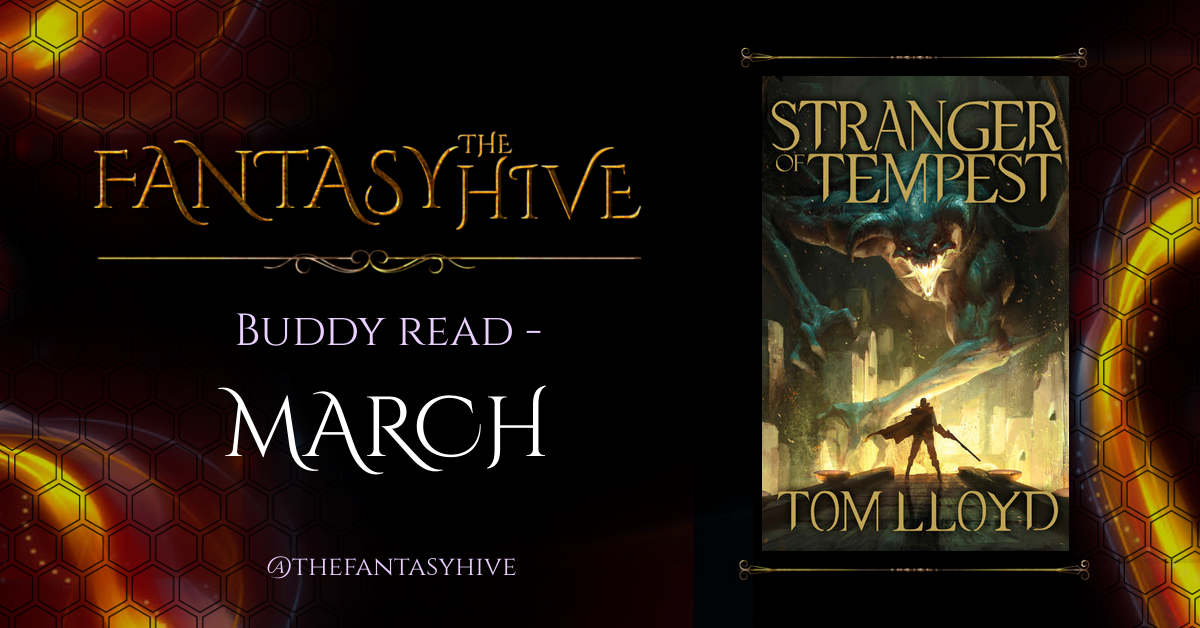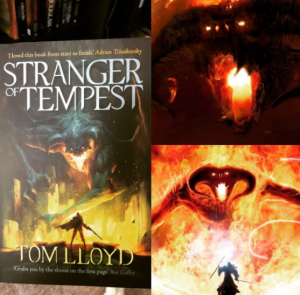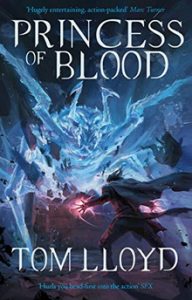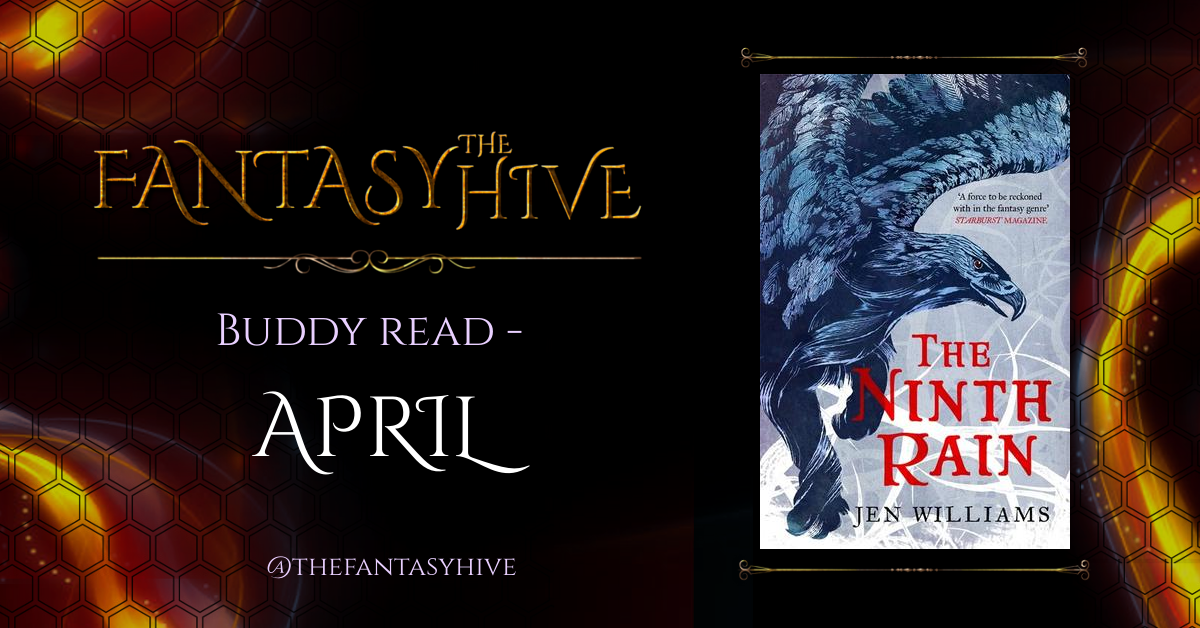The Hive Reads… Stranger of Tempest by Tom Lloyd
Welcome to the third instalment of our ‘Hive Reads’ feature! (You can read the others here.) After settling on Stranger of Tempest by Tom Lloyd as our March read, a bunch of us here at the Hive diligently noted down our thoughts whilst reading throughout the month. We’re a little bit late with this one, but you can finally read the end result below!
This month’s read is brought to you by the fabulous team of Alicia Wanstall-Burke, T.O. Munro, Kareem Mahfouz and Laura M. Hughes.

Laura M. Hughes: Here we are again! As always, let’s begin with first impressions. What does everyone think of Stranger of Tempest’s cover?
T.O. Munro: Lovely cover, but… is it me, or did Gandalf’s balrog from Moria just have a quick makeover and get transported to a steampunk (is this a rifle I see before me?)-type world?
Besides that, there seems to be a theme to a lot of covers lately of small foreground protagonist facing large background adversary – or is it just me?

Alicia Wanstall-Burke: I’m definitely picking up a theme! But I also love it, balrog included! Please see Exhibit A, via my insta account…

‘Exhibit A’
Kareem Mahfouz: I thought the cover was the absolute bollocks! Some lone nut-job facing down what looks to be a balrog! I loved the glow of the beast’s arm, it really *shines a light* on the situation facing Mr. Nut-job. Jon McCoy has done a lovely job.
I can see why T.O. could see it as the Balrog of Morgoth in a different frock, but for me (perhaps because of my juvenile and hyper excited nature) it lit a fire that I already knew burned hot, and then made me think, ooooooh what do we have here. So yeah… the bollocks!
Laura: It’s ‘the bollocks’, for sure! As is the author himself. Tom Lloyd was the first author I ever met in person, you know. He signed my 10th anniversary copy of The Stormcaller in 2016 and also drew me a lil’ cactus in there, too. I’ve been excited to read Stranger of Tempest for a while now, more so since I heard him read from its sequel (Princess of Blood) at another event (SRFC) last year.
Kareem: Tom and I are part of a very prestigious and super secret writing club that I may or may not have created… I’ve never met the guy but he is a frequent contributor and that makes him okay in my book (and that’s pun No: 2!!!!)
Laura: It’s not *that* secret… I’m in it, too, remember?
We’re all agreed that Tom is a top bloke. But what about his characters? Does anyone have a favourite? What did we all think about the protagonists? Personally, Lynx was my favourite. I loved his less-than-majestic introduction at the start!
T.O.: There’s a bit more to Lynx than the stereotypical battle-scarred veteran weary of blood and guts. It’s his background as the pointy end of an army for some fundamentalist/misogynist regime, his less than perfect physique, and his aspirations to something finer and more philosophical in life.
Kareem: Lynx is a weird one in that I like him but I don’t know why. Maybe it’s because Lad likes his scran! But he is massively introspective, and I’m drawn to characters that ponder their own existence, their state of being. And as my esteemed colleague T.O mentioned, his big ol’ belly makes him seem much more real.
T.O.: Lynx aside, the peril in all mercenary company stories is the plethora of characters all rapidly introduced. Very difficult for the author to give them each a distinctive persona at speed. I had similar issues with Jeff Salyards’ Bloodsounder’s Arc, the Road Brothers in Prince of Thorns, and Marek’s companions in Court of Broken Knives. I guess it is just inevitable that it takes a while for personas to begin to show through in these group stories. As a writer (and a reader) I am more comfortable with two handers or three handers.
Alicia: I quite enjoyed Anatin drunk at muster in the courtyard… Lynx is so far a good mix of expected and unexpected, and Kas because she’s Kas.
Laura: Kas is very cool! And yes, the early scenes with the mercenaries were a bit overwhelming because of all the new names, but the bits with drunken Anatin were hilarious.
Kareem: I think Anatin could be one of my faves. His banter is just great, I could listen to the bastard all day. Would love a night out with him too!
T.O.: Lynx grew on me more and more. He’s an atypical hero – scarred of course, but very far from being athletic. And who doesn’t like a literary-minded soldier?
“He brightened. Cities meant bookshops…” – My thoughts exactly!
Alicia: That’s the cutest line! “Lynx – mercinerary, rouge, reader.”
Where is the fainting couch? I need to swoon.
T.O.: Was that late-night-time Alicia at the keyboard there? ‘Mercinerary’? ‘Rouge’? Sounds like some kind of courtesan…
Alicia: UUUUUGHGGGHHHHHH YES! Alicia-from-last-night strikes again! FFS…. I could try and blame auto-correct, but it’s me. Maybe our Hive Queen will edit that stinker out?
Laura: I actually did, but then I decided to put it back in again because it made me snort. (Sorry)
T.O.: The characters are different to the stereotype – though, while I personally appreciate having an overweight bordering on middle-aged man as the protagonist, even my suspension of disbelief struggled at the allure in which the women Toil and Kas seem to hold him.
Laura: Good point! Lynx is a good bloke, but he doesn’t seem like *that* much of a catch…
So we all like Lynx, as well as supporting characters Kas and Anatin. Were there any of the cast people didn’t get along with? Or anything about the protagonists that you particularly disliked? I have to admit that personally, the word ‘mebbe’ bugged the hell out of me…
Alicia: Yes, phonetic dialogue is something I struggle with because I’ve been taught to avoid it, or use it very sparingly in my own work. It tends to jolt me a bit.
T.O.: I know of others who dislike and argue against the creation of ‘accents’ or idioms in characters’ speech. I think there can be a value in signposting through accent that a character has a particular place/station of origin, but I guess the jury is out on that. Sometimes it is the pattern/style of speech, the language they use, that tells us more about character than if they say ‘your’ or ‘yer’.
Kareem: I quite liked ‘mebbe’, but I suspect that is because of the Yorkshire lass I am eternally grateful (is she watching…) to be in a relationship with! #WhiteRose!
T.O.: In terms of voice, I still like Lynx best. We see other points of view as we go through the book – interestingly mostly women, who have a good representation as leading characters, but their drivers/motivations seem rather simple throughout.
Speaking of representation: diversity is to be welcomed in fantasy books. Depicting a range of ethnicities and sexualities is key to ensuring that fantasy writing doesn’t become some Sad Puppyish projection of a mono-tonal medieval-type world that never existed on this world or any other.
Lloyd, however, is the first author I’ve read who bluntly describes his characters as black or as white, and indeed has one character refer to another fellow mercenary in a card game as a “black b*stard.”
Diversity is to be welcomed in fantasy books. Depicting a range of ethnicities and sexualities is key to ensuring that fantasy writing doesn’t become some Sad Puppyish projection of a mono-tonal medieval-type world that never existed on this world or any other.
– T.O. Munro
Kareem: The diversity was something that struck me too. It was lovely to read, and it just seemed to fit all the more when you think about a band of mercs. They are a mismatched outfit, and come from all backgrounds, so that was a nail hit firmly on the head for me.
Laura: As you say, the diversity of the mercenary group is something that’s made obvious from the start, yet the author never beats his readers round the head with it, which is always nice.
In fact, the beginning of Stranger of Tempest is (in my opinion) much stronger than the middle and end. That’s not to say the book goes downhill; just that the first chunk is highly entertaining, particularly those early scenes featuring merc banter and card games. In fact, they reminded me favourably of similar scenes throughout Steven Erikson’s Malazan series.
And let’s not forget that opening sequence. What a cracking first page!
Kareem: The intro is one of the finest I have ever read. It’s brilliant! And I can see why that first exchange is plastered on the back of the book.
Alicia: The opening sequence is my favourite thing ever. Then I’m like, ok Lynx, stop looking at her boobies! *clap, clap* Let’s get on with it, son!
(An afterthought: that very first sequence left me with the distinct impression that Lynx was a very young man. The way he was just floored by seeing this naked chick made me think, ‘Wow, he’s still wet behind the ears, the poor kid!’ Next chapter, he’s a grizzled veteran worried that he’s getting tubby. I couldn’t quite get a sense of his age, and I think that made him a little hard for me to ‘see’.)
T.O.: That first line caught my eye more so than many of late. “For a damsel in distress, she was rather more spattered with someone else’s blood than Lynx had expected.” Sets up quite a few questions in what turned out to be quite an interesting framing story.
Laura: Speaking of the framing narrative: what did you guys think of the alternative timelines?
T.O.: I like framing stories and split time threads. For example, the framing inn setup in The Name of the Wind or Red Sister, or the split past and present time sequences in King of Thorns (and the other Broken Empire books). Here, with the past ‘Then’ and present ‘Now’ story merging at around the halfway mark and only ever having been a fortnight apart, it’s not so clear what the purpose of the framing story is. It’s sort of as if the author has heeded the advice of ‘start the story at the most impactful opening scene possible’, and yet has not found a way to make the essential backstory starting point that impactful. I’m thinking it might have worked just as well, story wise, to have told the scenes in chronological order.
Alicia: I would agree with you on the ‘start with the action scene’ summation. I can’t see any other reason why it was chopped up like that.
Kareem: I must confess to being confused in places, or say rather, disoriented. The ‘then’ and ‘now’ chapters seemed to whirl me around a bit, but that is quite possibly more a ‘me’ thing than any error on the book’s part.
Alicia: Sometimes I feel disoriented by ‘action first, flashback immediately after’ openings, but that’s not to say they aren’t effective or shouldn’t be done. Simply a personal preference.
I also found some errors early on that knocked me straight out of an otherwise enjoyable story 🙁
T.O.: Was it Mistress Pallow becoming Mistress Pellow? I’ve made more cringeworthy continuity errors in my (pre-edited) writing, but it still does feel like hitting a speed bump in an otherwise smooth read.
Alicia: Yeah it was, and I think the other ‘error’ was a misinterpretation on my part. Lynx is remembering a time when he had metal shackles on his skin, then later the guard cuts ropes off this wrists and ankles. I’m like, hold on, didn’t he have iron shackles biting into his skin a minute ago?? Turns out, no.
After that, it started flowing really well again.
T.O.: Yeah, the iron shackles reference confused me, too – I couldn’t work out how constrained Lynx was at first. Like the vice around his head was a metaphor for a hangover rather than a literal restraint.
It does flow pretty well during the beginning – a good readable pace. There was a section on a card game which felt a little heavy, but has plot significance because of the way the mercenary company is structured and ordered drawing on the hierarchies in this world’s standard pack of playing cards. That said, the scene still whetted my curiosity enough to go back and make sense of the graphic depicting the suits of cards.
Laura: I thought the card suits (and the mercenaries being a ‘deck’) was really neat, and liked how it clearly ties into the title of each book in this series. However, I would’ve liked more info about the ‘God Fragments’ aspects – particularly given that that’s the title of the series!
What did everyone else think about the worldbuilding aspects? Did the world and the magic feel original? What did/didn’t you like?
T.O.: I was struck by several features;
- The concept of a mage-gun – sort of further mixing sorcery and steampunk, a bit like the Powder Mage series did (insofar as I know it, having only read one short story by McClellan).
- The Order of the Knights of Oak, which reminded me of those crusading knights – the Templars (or even the Hospitalers) who provided succour and security for weary travellers until a jealous pope accused them of heresy in order to confiscate their accumulated wealth.
 Then there is this feature in the sky: “the hazy smear of the sky river, a vast striated band that encircled the world.” Sounds to me like this planet has borrowed some of Saturn’s rings! Which makes a refreshing change from the multiplicity of moons with which so many writers individualise their worlds with little thought for the way that will fuck with the tides (honourable exceptions being The Waking Fire and The Iron Ship). Later on we get told that the world’s shadow would start to trace a path across the skyriver and “provide Lynx a simple means of charting the night’s progress.” Seeing this helps me make sense of the line “I’ll wake you at shadow’s peak.” Even later on, there is a reference to “Currently visible on the Skyriver were about a dozen smaller discs” – which made me think of shepherd moons, the tiny moons whose gravity helps keep Saturn’s rings in order. (Enya wrote a song about them.)
Then there is this feature in the sky: “the hazy smear of the sky river, a vast striated band that encircled the world.” Sounds to me like this planet has borrowed some of Saturn’s rings! Which makes a refreshing change from the multiplicity of moons with which so many writers individualise their worlds with little thought for the way that will fuck with the tides (honourable exceptions being The Waking Fire and The Iron Ship). Later on we get told that the world’s shadow would start to trace a path across the skyriver and “provide Lynx a simple means of charting the night’s progress.” Seeing this helps me make sense of the line “I’ll wake you at shadow’s peak.” Even later on, there is a reference to “Currently visible on the Skyriver were about a dozen smaller discs” – which made me think of shepherd moons, the tiny moons whose gravity helps keep Saturn’s rings in order. (Enya wrote a song about them.)- I was also struck by the fact that our hero Lynx hails from an oppressive imperialistic regime renowned for its maltreatment of conquered people. Shades of recent wartime atrocities – casting Lynx as a refugee from service with some version of imperial Japan, Isis, or Nazi Germany. Reminds me of this Mitchell and Webb sketch where two german soldiers slowly wake up to the fact that “maybe we’re not the good guys.”
Alicia: The mage guns reminded me of The Waking Fire and how much I’m not used to reading fantasy with firearms! I like how it’s a different angle, giving the presumably non-magical folk in the world a bit of helpful, highly explosive magic to chuck at their enemies.
Laura: The mage guns were badass. Agreed!
Like T.O. mentioned, there are a whole bunch of really cool worldbuilding aspects here. Any further thoughts on the world and its inhabitants?
T.O.: One of my first thoughts while reading was that there seemed to be a lot of nice non-corrupt people, more so than you’d be used to in a grimdark fantasy world. The city watch are on the whole a decent bunch not given to thieving, fleecing or bribery. The mercenary company aren’t a raucous exploitive bunch given to murder and mayhem for its own sake. That’s OK, and I guess helps keep the focus on the main plot, but it does mean that at times a build up of tension dissipates a little more readily than you’d expect.
 Also – the love interest? Or is it lust interest? Of my recent reads, only Jonathan French’s The Grey Bastards and Lawrence’s Prince of Fools got their protagonist into bed quicker, and while the women involved are very much in control of their situation, they also seem to be the ones most often imagined with no clothes on. Nice to see the balance redressed before the end!
Also – the love interest? Or is it lust interest? Of my recent reads, only Jonathan French’s The Grey Bastards and Lawrence’s Prince of Fools got their protagonist into bed quicker, and while the women involved are very much in control of their situation, they also seem to be the ones most often imagined with no clothes on. Nice to see the balance redressed before the end!
However, I did struggle with the way plot revolved around the character Toil. Bit of a spoiler alert here, but when we first meet her, she appears to be an assassin masquerading as a courtesan who hired – through proxies – a bunch of mercenaries she’d never met to help bust her out of the city once she’d killed her target, plying (or playing) the mercenaries with some cover story about the abducted teenage daughter of a merchant.
It is possible that I misunderstood, but it felt at that point to be a bit of a fragile/tenuous plot thread. There are surely more reliable ways to plan and conduct an assassination mission? Then again, she’s maybe one of those psychopathic bipolar assassins rather than the rigorously methodical type. Certainly her character presents as a bit of a nutter.
(Alicia: *giggles* nutter! *giggles*)
T.O.: To that extent, the first half of the book felt as though we were assembling characters, building backstory and setting up conflicts for what turned out to be a slightly different kind of story.
Laura: I have to agree with you here. I praised the book earlier (deservedly so) for having such a strong beginning, but… did anyone else experience issues with things slowing down a lot?
Kareem: If I’m being brutally honest, there were a few parts of the story where I felt the pace dropped, and for no real reason that I could see. One instance is in a Sitain chapter, where she meets a holy man, as it were, and he seems to become part of the cards and for a while seems significant, but then is never heard from again. I am recapping now and I may have missed something, but I recall it derailing me slightly. Anyway, fast forward to the end and I have to say I finished the book laughing out loud. Well played, lady mercs… well played!
I have to say I finished the book laughing out loud. Well played, lady mercs… well played!
– Kareem Mahfouz
Laura: You’re right, the ending was a lot of fun!
Did anyone else have similar issues with the pacing and plot?
T.O.: The author has imagined a very vivid world with its own individual selling points. But the book felt more like a tour through the author’s fertile imagination than a developing story in its own right. We have action, peril and battles, but we don’t get answers to key questions like who the Duegar were, or development of Sitain’s powers, or an understanding of Toil’s motivation and the real politik of this world – we end with cryptic clues about other political developments.
My gripe is that these elements are all slung on a rather slender plot line – a bunch of mercenaries and the assassin who hired them fleeing retribution. There are characters I might have wanted to know more about – Teshen, for example – but at the end of the story I found myself asking: what actually happened?
Looking back on the whole vista, there is a lot of interesting world building both in the recent past (of war with So Han) and the more distant past (The origins of the Duegar) and the political architure of military orders and state sponsored assassination and espionage. The magic system is different but internally consistent – the concept of mage bullets that mean the same gun can have powers ranging from a rifle to a howitzer depending on what cartridges are loaded.
In the end, it felt like an introduction to a world milieu and the characters within it – more of a setup for what would follow in the next books. In short, I felt it lacked the big payoff.
Laura: Hm. I have to say, I loved the world, but also felt slightly disappointed with the big climax as well. Though I do like a good boss monster!
T.O.: The resemblance in the cover illustration to that scene from The Lord of the Rings is not – it appears – accidental. The climax of a long underground trek through the ruins of a once magnificent civilisation culminating in a battle with a demonic monster on a bridge over a subterranean chasm is fairly accurately foreshadowed by the familiar elements of that illustration. This time, though, the stand-ins for Boromir and Aragorn are wielding a bit more firepower than a heroic shout of “He cannot stand alone”, and I will leave it for the reader to discover which fools fly and in what direction.
During that scene, there are some lines to savour and others to smile at – though my schoolboy chuckle at this line may not have been what the author intended:
“Then a great shape moved on the far side lit by fires of its own behind…”
To be fair, the line goes on:
“Then a great shape moved on the far side lit by fires of its own behind a veil of darkness.”
Possibly a comma might have been appropriate there!
Laura: Ha! Speaking of quotations, are there any others that amused/resonated with you?
Alicia: Toil’s opening line – “You’ll have to wait, I’m busy” – read in context is an absolute cracker
T.O.: I liked this one for the sadly hungover Lynx: “Lunch came and went in a rather more literal fashion than Lynx was comfortable with.”
Also, early on when a guard criticises Lynx’s attire (“Shades of grey, eh? some sort of mercenary statement is it?”) that made me smile, maybe for the flicker of a reference to E.L. James’ seminal work, or just to a fashion choice that not everyone can pull off 🙂
“The Skyriver brushed their path with a dull silver sheen” – I like that image of a night lit by the reflected light of this world’s ring system.
Laura: Yes! The skyriver was a lovely touch, and allowed for some really beautiful imagery during the quieter, reflective scenes on the road.
We’re nearing the end of our review now. Before we go, does anyone have any recommendations for similar books to Stranger of Tempest?
T.O.: Jeff Salyards’ Bloodsounder’s Arc is another book following a new entrant into a company of soldiers on a mission. I can see parallels between the two – and am curious as to how well Captain Anatin bears up in comparison to the incomparable Braylar Killcoin in future books.
Laura: Great comparison! I’d also suggest that anyone who enjoyed the mercenary banter check out the Malazan series by Steven Erikson. I like to think the soldiers in those books – particularly the Bridgeburners and the Bonehunters – had some influence upon the creation of Anatin and co., and I also enjoyed this world’s inclusion of ‘Burners’ (also the name of fire-based grenades used by the Malazan marines).
Thanks again to our wonderful reading team of Alicia, T.O., Kareem and Laura (me). Be sure to stop by soon to see what we (and others) have to say about The Ninth Rain by Jen Williams!


[…] and who knows what will come of it? That all sounds great (we read Tom’s Stranger of Tempest here). For those who follow you on Twitter, what is the OFJ, and who is Mr […]